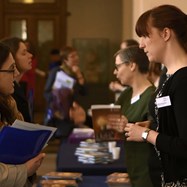GCSE results and trends
21 August 2014
Commenting on this year’s GCSE results Dr Wendy Piatt, Director General of the Russell Group of universities, said:
“Congratulations to all those pupils who have worked so hard for their GCSE grades. We hope those aspiring to go to a leading university will think carefully about the next steps and pick their A-level or equivalent subjects wisely.
“We welcome the move away from entering students for exams too early, which was disadvantaging some pupils. It is right that students to sit exams when they are ready to do so and we are pleased to see more getting the chance to get a top grade.
“It is a shame that after recent increases, entries in modern foreign languages have plateaued this year. If the UK is to engage fully with the wider world in business, diplomacy and academia then many more young people need to study languages. We hope today’s successful pupils will consider doing languages at A-level and beyond, where it is the right thing for them.
“We note that numbers students taking separate science GCSEs have fallen this year – albeit with more taking the new Further Additional Science qualification. We know, from previous years, that pupils who take separate science GCSEs are more likely to take and excel at STEM subjects at A-level. We hope the increase in Further Additional Science also results in more students taking science A-Levels in future. It would be a cause for concern if they do not.
Choosing the right A-level subjects
“Young people should choose subjects which give them the best possible preparation for their chosen degree or which keep as many options as possible open for them, for example by taking facilitating subjects, such as English and maths.
“Pupils from families with less experience of higher education are in particular need of good information and advice from their schools and careers services. That’s why we published a guide called Informed Choices, which aims to improve information about how subject choices at school can impact on university applications.”
Notes to editors
- Entries for modern languages declined by 2.8% compared with last year.
- The odds of getting an A or B at A-level chemistry in the maintained sector are increased for pupils who take three separate science GCSEs compared to those who took double science. Source: Science and Innovation Investment Framework 2004-2014: Next Steps (March 2006), p.47. Available from http://webarchive.nationalarchives.gov.uk/+/http://www.hm-treasury.gov.uk/media/7/8/bud06_science_332v1.pdf
- The facilitating subjects at Advanced-level are English literature, maths, physics, chemistry, biology, history, geography and modern and classical languages. These are subjects that are required more often than others by Russell Group universities. More details are available in Informed Choices.
-
Hamir Patel
hamir.patel@russellgroup.ac.uk
020 3816 1316
-
Hollie Chandler
Hollie.Chandler@russellgroup.ac.uk
020 3816 1307
 X
X

